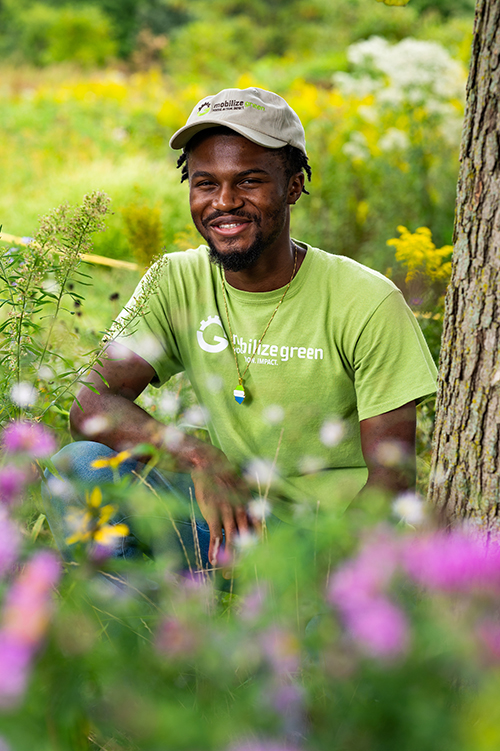BEES Major Calvin Keeys Awarded Scholarship for Black and Latinx Birders
By Gina Myers
October 21, 2021
In May 2020, an incident involving Christian Cooper, a Black birder, and Amy Cooper, a white woman, made national headlines when a video of Amy Cooper making a false police report against Christian Cooper appeared on social media.
In addition to highlighting how white people—and especially white women—can weaponize racial fear, the incident also led to discussions of creating a more inclusive outdoors. To this end, Amplify the Future launched the Black and Latinx Birders Scholarship. The organization’s mission is to amplify opportunities for equity in conservation. According to their website, they “envision a system in which higher education is free, equitable and accessible in the United States.” Until that moment, they are committed to providing scholarships and networking opportunities to students historically excluded in conservation.
 Calvin Keeys photographed by Chris Baker Evens
Calvin Keeys photographed by Chris Baker Evens
First-year environmental science student Calvin Keeys was recently named a recipient of the scholarship. “It felt really good [to find out I had been awarded the scholarship,” he says. “I’m very grateful. I made sure to email them immediately to thank them for considering me, reading my application and interviewing me.”
In addition to the scholarship, Keeys will also have the opportunity to connect and network with members of Amplify the Future, with the possibility of internships and other opportunities down the line.
Keeys found out about the scholarship through a chain of events: His high school art teacher had added him to a WhatsApp group for birders. Through there, he heard about an interview that Christian Cooper was giving on Audubon’s Facebook page, and that is where he learned of Tykee James, who works for the National Audubon Society, and who, inspired by the incident with Cooper, co-organized Black Birders Week.
“During the interview with Christian Cooper, he mentioned his podcasts and that he’s part of the Wildlife Observer Network. I started listening to one of his podcasts, Brothers in Birding, and he mentioned the Black and Latinx Birder Scholarship that Amplify the Future was doing,” explains Keeys.
In his application, Keeys discussed work he was doing as an intern with MobilizeGreen at John Heinz National Wildlife Refuge in Philadelphia. The non-profit organization offers “conservation opportunities across the nation that give high school students access to the experience and real-world problem solving that allows them to build rewarding careers.”
“MobilizeGreen has the goal of presenting the field of conservation to underrepresented youth, and that’s part of what I would like to do as well—to find some way to give underrepresented people a way to get involved in nature and conservation,” says Keeys.
For his internship, he was part of the urban conservation crew. He was involved with different conservation projects, from getting rid of invasive plants that are within the refuge to doing invasive fish removal and cleaning up trash. Each intern also had to come up with their own conservation project. Keeys chose to work on a trash cleanup at Cobbs Creek with the Land Health Institute.
Keeys’s interest in science has been informed by his father, a secondary education science teacher, who would take him to the Philadelphia Zoo, Franklin Institute, Academy of Natural Sciences, and John Heinz, among other places. On those trips, as well as through books, he discovered his interest in animals and wildlife biology. Keeys also credits his love of science to George Washington Carver, Stephen Hillenburg, David Attenborough, and the Kratt Brothers.
While Keeys enjoys birding as a hobby, he isn’t yet sure what role it will play in his future, but he could be interested in researching birds further in the field or in the lab. Though he is only in his first year of college, he imagines that he will work for a few years after graduation before pursuing a master’s degree.
Keeys was also recently featured in a Grid Philly article about MobilizeGreen. Read “Program empowers BIPOC youth to explore conservation and wildlife biology as potential careers.”